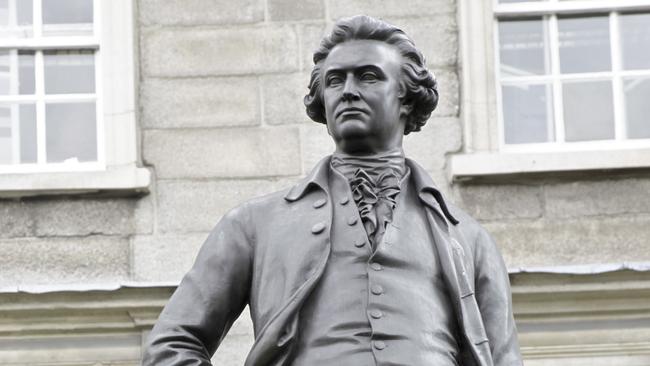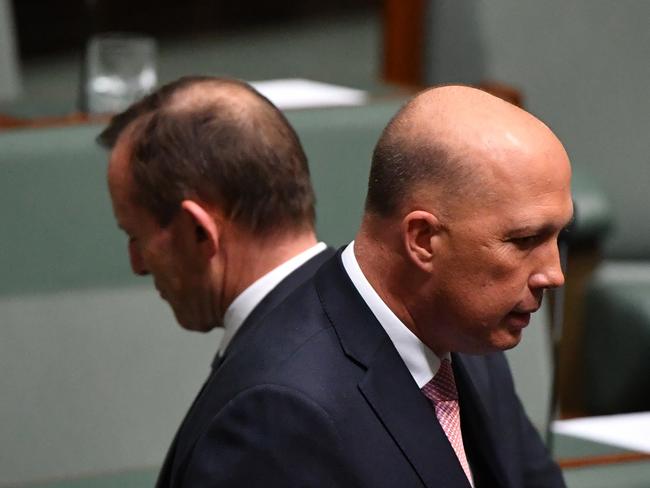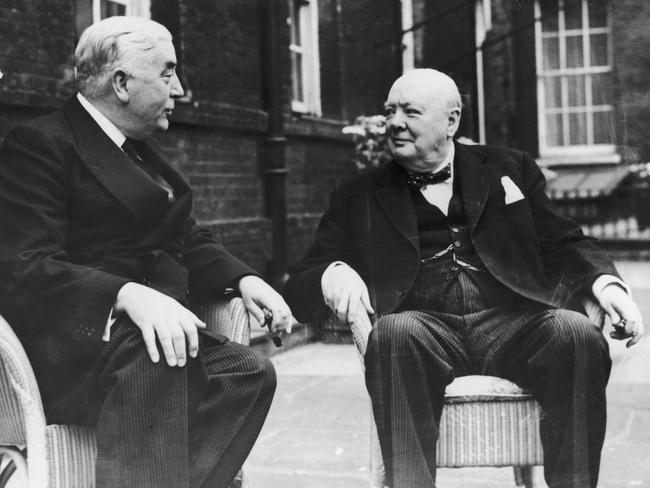The five planks of political conservatism
If Scott Morrison can add a Burkean feel for the common people to his liberal-conservative demeanour he might just succeed.

During the political mayhem of the past two weeks, the terms “conservative” and “right wing” have been employed routinely in reference to the initiators of the attempted leadership coup in the Liberal Party, and to their urgers and backers.
That same Liberal Party is described as being split between moderates and conservatives. Yet virtually no attention has been paid to what these words mean. They are tossed off loosely and rashly, serving as little more than rhetorical devices, and are often used simply as terms of abuse.
Not only that, but “conservative” is being overused as lazy ideological shorthand to describe what has propelled members of parliament, including senior ministers. The frenzy of hysterical action that accompanied the coup seemed to me to be less motivated by political belief and more by egoism and eruptions of the age-old drivers of ambition, vanity, fear, and panic.
In general, a lamentable tendency has developed in Australia, to over-ideologise the behaviour of people in public life. Rank self-interest is often downplayed, then misread, cloaked in the disguise of ideals and principles.
Just to state the obvious, if Peter Dutton and his co-conspirators pretend to be conservatives, their actions are in flagrant contradiction of the first principle of political conservatism: respect for constitutional order.

At the heart of Australian political order is the democratic principle that the people elect the government and, by accepted custom today, the prime minister who leads it. To pre-empt the will of the people by deposing a prime minister is a kind of insurrection, with all the destabilising consequences of revolutionary behaviour. Nothing could be more anathematic to a true conservative temperament.
The only exception I can imagine is where the leader has descended into a state of palpable madness and is imperilling the nation. This was the case in the later years of King George III, although he was a hereditary monarch and there was a prime minister under him governing Britain — for much of that period, an extraordinarily able one: William Pitt the Younger. In all other circumstances, the testing of the leader should be left to the people, which happens here every three years. The same can be said about the illegitimacy of Malcolm Fraser’s ousting of Gough Whitlam in 1975.
I want to reflect on what, if anything, the term “conservative” might plausibly mean today. Conservatism, sometimes conflated with Toryism, dates from the start of modern politics. It remains unavoidable as a keyword in our political vocabulary.
Political conservatism needs to be distinguished from moral conservatism, with which it is often confused. Moral conservatism has tended to identify with the Right side of politics. Recent attachments include traditional marriage, sympathy for religion, hostility to pornography and euthanasia, and placing importance on public civility and good manners. But this is not necessarily the case, as illustrated in the fact that more traditional Catholics have belonged to the parliamentary Labor Party in Australia than to the Liberal Party; and many feminists, who tend to be on the Left on most issues, are opposed to pornography. Malcolm Turnbull, usually ultra-liberal on social issues, turned pious moralist against Barnaby Joyce. Of topical relevance, there is no reason to expect a moral conservative to have any special regard for constitutional order.
My interest here is in political, not moral, conservatism. Conservatism in the Anglosphere takes as its bible Edmund Burke’s Reflections on the Revolution in France, first published in November 1790, written on the threshold of modernity. It does so for good reason. Burke put the either/or that has constituted the political divide that has shaped the modern world — a world made possible by the Industrial Revolution, its capitalist aftermath and the rise of parliamentary democracy.
That is a divide between two quite different temperaments, or intellectual dispositions: on the one side, the progressive impulse and on the other, the conservative one, although conservatives, unlike reactionaries, do believe in reforming change.
Progressives and conservatives start from the same first premise, of seeking the best way to provide a good life for a society and its people; they then diverge, on principles and methods.
Burke’s primary charge against the French Revolution was that it sought to transform the world based on a theory. It made the utopian assumption that a society could be designed from scratch by well-meaning individuals using no more than their powers of reason, and following the high-minded principle of equality. “Rage and frenzy will pull down more in half an hour, than prudence, deliberation, and foresight can build up in an hundred years.” Also, the champions of theory were as falsely optimistic about the malleability of human nature as they were about human society. They “are so taken up with their theories about the rights of man, that they have totally forgot his nature”.
The assumption about the malleability of human nature is older. Its origins are found in Socrates’ view that it is possible for individuals to reform being through thinking: the rational person can change any aspect of their character that they don’t like, if they so choose. The Socratic assumption has gained pervasive influence in the past century with the spread of psychotherapy and self-help cultures. From the conservative perspective, which is of its nature sceptical, Socrates’ confidence in the human powers of rationality and free will and their capacity to change self and world was inflated, and at odds with the irrational reality of human nature. Freud would have agreed.
Progressive radicalism in its pure form, as expressed in the French and Russian revolutions and in multiple catastrophic imitations such as the former East Germany, Cambodia, North Korea, Venezuela and others, is a temperamental conceit, a narcissism of the intellect. Dostoevsky satirised socialism in his novel The Possessed in a portrait of one of its intellectuals who devoted his life to writing a massive rational treatise planning the perfect society, starting with the principle of unlimited freedom, but ending in unlimited despotism. As shrewd a social observer as Karl Marx, infected by the same mindset, could dream of his communist revolution leading to an egalitarian paradise. The turning of Marxist ideas into political practice over 1½ centuries would illustrate Burke and Dostoevsky’s dark prophecies to the letter.
The main consequence of theory applied on a revolutionary scale is unintended consequences, to the point of negation. Burke was alone in predicting in 1790 and ahead of the events that the French Revolution would lead not to liberty, equality, and fraternity but to the Terror, regicide and Napoleonic pillage and conquest. And while the age of levelling revolution may have ended in 1989 with the fall of the Berlin Wall, two centuries on from the storming of the Bastille, the appeal of radical idealism has not waned.
As a bewildering caricature in our time, there is green energy policy that would ban coal and nuclear, justified by the fantasy that wind and solar can supply baseload power; resulting blackouts would render the smartphones of inner-city Greens useless.
Societies and their institutions are complex, far beyond the understanding of even the most intelligent individuals. Hence the only sure way to build good institutions is over time, using the wisdom of generations. To Burke’s mind, the grave business of politics requires a mood of humility and respect: the faults of the state should be approached as “the wounds of a father, with pious awe and trembling solicitude”. A sentiment on which a chastened Dutton might reflect.
Political conservatism is best characterised, I want to suggest, by its temperament. I mean temperament as a kind of instinct or reflex: an unconscious habit of mind that triggers automatic responses to critical political issues.
Five main elements compose the conservative temperament. First, there is a liking for order and a society in which things work: where there are plentiful goods in the shops; trustworthy banks; clean streets and parks; where rubbish is collected; where there is orderly traffic; safe neighbourhoods; well-organised sporting events; and fluent public transport. Failure of the general contributors to comfortable and smoothly running everyday life irritates.
In the English tradition, the intellectual pedigree that preceded Burke was provided by William Shakespeare and Thomas Hobbes. Shakespeare, in Troilus and Cressida, stresses the importance of degree, by which he means order and hierarchy: “O, when degree is shaked, which is the ladder of all high designs, the enterprise is sick. Take but degree away, untune that string, and hark what discord follows.”
Hobbes, in Leviathan, says any human society without a strong, controlling state will descend into anarchy in which life is solitary, poor, nasty, brutish and short.
Second, there is love of country. An instinctive patriotism induces warm feelings towards the homeland and those with whom it is shared. As a consequence, the nation state is held to be the fundamental social entity, the locus of principal identification, belonging and attachment. Supranational organisations such as the UN and the EU are distrusted, as are quasi-legal bodies like the Australian Human Rights Commission.
Third, there is respect for the common people, for existing institutions and for the nation’s past. Burke described the state as an enduring contract or partnership “between those who are living, those who are dead, and those who are to be born”.
It is another narcissistic conceit to believe that we who live today, preoccupied by concerns and pleasures in the here and now, are of sole importance. Rather, we are born into a culture that nurtures us from birth, one which we inherit, and which we are responsible for handing on to our children in a better state than we found it.
Burke’s confidence in the common people and their native good sense was almost rhapsodic:
In England we have not yet been completely embowelled of our natural entrails; we still feel within us, and we cherish and cultivate, those inbred sentiments which are the faithful guardians, and active monitors of our duties, the true supporters of all liberal and manly morals. We have not been drawn and trussed, in order that we may be filled, like stuffed birds in a museum, with chaff and rags, and paltry burred shreds of paper about the rights of man. We preserve the whole of our own feelings still naive and entire, unsophisticated by pedantry and infidelity.

Robert Menzies projected a similar conservative ideal in his 1942 tribute to the “forgotten people”. It was fundamental to the foundation and success of the Liberal Party:
I do not believe that the real life of this nation is to be found either in great luxury hotels and the petty gossip of so-called fashionable suburbs, or in the officialdom of the organised masses. It is to be found in the homes of people who are nameless and unadvertised, and who, whatever their individual religious conviction or dogma, see in their children their greatest contribution to the immortality of their race. The home is the foundation of sanity and sobriety; it is the indispensable condition of continuity; its health determines the health of society …
John Howard was the last of the leading Liberals to articulate some of this ideal, one which the contemporary party has treated as some kind of dusty, unmodish relic, to its detriment at the ballot box. Scott Morrison may be able to restore some of this warmth and affinity with the common people.

The fourth element in the conservative temperament is scepticism. Drawn to moderation and balance, it is instinctively wary of enthusiasm, of charisma in politics, of ideology, and of fanaticism of any colour, whether in politics or religion. There is a complementary recognition that effective politics is unglamorous. It is, in the words of German sociologist Max Weber, “a strong and slow boring of hard boards”.
Fifth, in relation to defence and international relations, the conservative inclination is to unidealistic realpolitik. The national interest should almost solely govern geopolitical policy. Long-term defence strategy requires prudence, preparation and vigilance, and assuming the worst in terms of the intentions of potentially hostile regional powers. In general, the conservative temperament prides itself on worldly realism.
Joseph Conrad wrote about a “national spirit”, which alone gives us the feeling of an enduring existence, whatever the circumstances, and an invincible power against the fates. Burke anticipated some of Conrad’s “spirit” in his passage comparing the French revolutionaries and their English sympathisers with the common people:
Because half a dozen grasshoppers under a fern made the field ring with their importunate chink, whilst thousands of great cattle, reposed beneath the shadow of the British oak, chew the cud and are silent, pray do not imagine, that those who make the noise are the only inhabitants of the field; that of course, they are many in number; or that … they are other than the little, shrivelled, meagre, hopping, though loud and troublesome insects of the hour.
This kind of spirit provides the bedrock for the conservative temperament, underlining a deep empathy with the homeland and its silent majority of forgotten people.
Let me turn to conservative politics in practice. It is not simply the temperament in action. The practice has its own rules, three main ones. First and foremost, and obviously, the imperative for any government is to preserve and protect the nation, its institutions, and the rule of law.
Machiavelli said the only concern of any prince should be that the state he rules be strong. This is the single, commanding moral principle of politics. Machiavelli was writing in Renaissance Italy during a period of extreme political instability and warfare, so the question of a strong state being a just one was of less concern than fits the modern world. A weakness of conservative thinking is that in its concentration on order it can become complacent about social injustice and excessive inequality.
As a second rule of government, abuses of power must be checked. For Burke, a thoroughly liberal conservative himself, this was the primary rule. He was a lifelong opponent of English oppression of Catholics in Ireland; he supported the independence of the American colonies, on the grounds that if they could not be kept as a part of the British Empire by desire, they shouldn’t be kept by force; and he single-handedly, and with superhuman effort over many years in parliament, reformed the conduct of the British East India Company in India, hitherto rampant in its extortion, plundering and rapacity.
Today, the main abuse of power is in the excesses of capitalism. Adam Smith’s axiom that an invisible hand guides any free market, and produces the most prosperous and just economy is a partial truth. A free market will produce the most efficient and prosperous economy, but it is given to excessive greed: to wit, US banks leading into the global financial crisis, not to mention some of our own financial institutions in recent years, whose conduct has been no better than that of back-alley swindlers. Radical proponents of the free market and hard-core laissez-faire economics, in assuming the invisible hand to be pure and virtuous, are, in philosophical terms, ultraliberal, and to my mind misguided. They are not conservative.
The development of the welfare state in all Western countries since 1945 has indirectly aided governments in checking abuses of power, making impossible the unfettered capitalism that held sway in, say, the robber-baron 1890s. The “safety net”, as appositely termed by the Hawke government, has acted as a counterweight to increasing social inequality, and has proved an incontrovertible good. Winston Churchill, arguably the 20th century’s greatest conservative, supported the welfare state from early in his political career, although it did require a socialist-inclined government in Britain to first implement it at the end of World War II. The welfare state is arguably socialism’s one achievement.
On the other hand, recent US literature on dynamic cities and regions suggests they depend on small government, low taxation and low regulation. Conservative politics should err on the side of small government.
The third and final rule for conservatism in political practice is to nurture capitalism, an economic system not yet known in Burke’s time, when the Industrial Revolution was still embryonic. Capitalism is the source of our prosperity, the reason that virtually all the afflictions that cursed our pre-modern ancestors have gone: brute poverty, endemic disease including frequent population-decimating plagues, famine, gruelling labour and even near constant warfare. Any reasonable person with some historical sense ought to love capitalism.
But capitalism is, in its driving logic, anti-conservative. Remorseless in overturning all inherited religions, customs, and institutions; a juggernaut crushing all businesses, free associations and communities that get in its way: it is the great revolutionary force, ceaselessly at work transforming the modern world, as Marx first pointed out.
In the recent era, the IT revolution has forced changes in offices, factories, shops and homes, as it has made swaths of jobs redundant, while opening up unforeseen new entrepreneurial opportunity.
Joseph Schumpeter, the foremost 20th-century interpreter of capitalism and himself a political conservative, characterised its method, or inner momentum, as “creative destruction”. He lauded capitalism as the greatest engine for generating wealth ever seen in human history. Indeed, the welfare state would not be possible today without the national wealth sourced in an industrialised economy, wealth that did not exist at the time of the Depression.
Capitalism, through the generation of wealth, has played the vital enabling role in the expansion of universal rights in the West since 1945. For instance, it made possible large-scale employment of women, thus freeing them from narrow roles and the economic necessity that bound them to the traditional patriarchal marriage. It also supplied the labour-saving devices that radically reduced the drudgery of running a home.
Even in terms of the ideas framing universal rights, the liberal emphasis on the freedom of the individual, in combination with the centuries-old judicial principle of equality before the law, has been more influential than the socialist creed. That is not to deny that there are times in which the progressive impulse has been beneficial, as in the contribution of feminism to the improvement in women’s rights from the 1960s.
Progressive thought in its mainstream socialist lineage, placing primary emphasis on equality, draws on various sources: the teachings of Jesus; the American Declaration of Independence; Thomas Paine’s Rights of Man, published in 1791 to counter Burke’s Reflections while praising the French Revolution; and, above all, liberalism itself, of which it is mainly a subspecies. The main intellectual influence on Paine was philosopher John Locke, the “father of liberalism”. Marx would later provide socialism with its notorious anti-capitalist rhetoric, although Marx himself celebrated industrialisation.
The recognition of universal human rights, a major accomplishment of the West in the past half century, has been a joint achievement of liberalism and capitalism, with an admixture of progressive egalitarianism. This achievement is a healthy reminder that sensible politics is often in practice, and at its best, not polarised between two camps intolerant of each other but operates as a complex blending of different ideas and enthusiasms.
Political conservatism today has to be liberal to be viable in a society that emphasises individual freedom and places primary moral authority on the conscience of the individual. The liberal principle is now taken for granted by almost everyone, affirming that the best society leaves individuals alone to live as they choose, as long as they don’t harm others, which is a principle that favoured same-sex marriage. It is also a principle that has special affinity with a free market, in preference to a command bureaucratic state.
Conservatism then supplies the institutional and legal context for this liberal principle, articulating the constitutional foundations of the nation, thus preserving stability and continuity. It reflects and fortifies a culture that gives flesh and blood to the social fabric in which people live as best they can.
Returning to current events, the implication of my argument is that political leaders either have a conservative temperament or they don’t. A person’s temperament tends to be inborn. What I mean is a liberal-conservative temperament. Tony Abbott was too much the moral conservative, awkward in relation to the cultural predisposition of the times. Turnbull appeared too often to lack conviction, conservative, liberal, or progressive, acting like a dilettante. It was as if he was ill at ease in his role, and perhaps in political leadership altogether, given the lack of loyalty he attracted from his ministry during the coup.
Morrison has the right liberal-conservative demeanour. If he can project something like a Burkean persona into the public mind and fulfil the many other requirements of leadership, he might succeed.
John Carroll is professor emeritus of sociology at La Trobe University.


